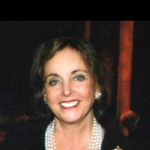BIO Honors Nan A. Talese
Biographers International Organization will present its third annual Editorial Excellence Award to the legendary editor Nan A. Talese, senior vice president of Doubleday and publisher and editorial director of her own imprint, Nan A. Talese Books at Doubleday, at an evening reception on October 5 in New York City.
 In the course of fifty years, Nan Talese has edited and published some of the most distinguished biographiess and nonfiction works of our time, including A. Alvarez’s enduring classic, The Savage God: A Study of Suicide; Thomas Kenneally’s Schindler’s List; Phyllis Rose’s Josephine Baker in Her Time; François Gilot’s Matisse and Picasso; Benita Eisler’s O’Keeffe and Stieglitz; Antonia Fraser’s Marie Antoinette; many books by Peter Ackroyd, including The Life of Thomas More, Shakespeare, Chaucer, J. M. W. Turner, Newton, Poe, Chaplin, and London Under: The Secret History Beneath the Streets; and Deirdre Bair’s Saul Steinberg and the forthcoming Al Capone: His Life, Legacy, and Legend, among many others. We spoke with Nan briefly about the experience of editing biography and what she looks for when considering the acquisition of a book.
In the course of fifty years, Nan Talese has edited and published some of the most distinguished biographiess and nonfiction works of our time, including A. Alvarez’s enduring classic, The Savage God: A Study of Suicide; Thomas Kenneally’s Schindler’s List; Phyllis Rose’s Josephine Baker in Her Time; François Gilot’s Matisse and Picasso; Benita Eisler’s O’Keeffe and Stieglitz; Antonia Fraser’s Marie Antoinette; many books by Peter Ackroyd, including The Life of Thomas More, Shakespeare, Chaucer, J. M. W. Turner, Newton, Poe, Chaplin, and London Under: The Secret History Beneath the Streets; and Deirdre Bair’s Saul Steinberg and the forthcoming Al Capone: His Life, Legacy, and Legend, among many others. We spoke with Nan briefly about the experience of editing biography and what she looks for when considering the acquisition of a book.
TBC: Can you provide us with a telling example of how working actively with an author improved one of the biographies you published?
Talese: The best example may be the first biography I edited, A. E. Hotchner’s Papa Hemingway (1966). The author and I sat together with the manuscript. I pointed out scenes that seemed less interesting than other scenes or that did not contribute to the reader’s understanding of the character of Hemingway. I asked him questions: “What is going on there? What do you want to convey?” and he answered and I would say, “Put that in!” We ended by cutting one fifth of the manuscript and adding another one fifth in.
TBC: What do you look for in a proposal or a manuscript?
Talese: The first thing I consider is whether the subject is well known and well respected, and what the crucial scenes were in his or her life. What caused a subject to change his mind or direction? Then I look for whether the author has a gift for storytelling and whether the writer’s voice transfers his or her passion to the reader and the page. I look for the ability to tell a powerful story while being very careful to stay within the facts.
TBC: What are editors looking for today?
Talese: Fortunately or unfortunately, there is a great deal of interest in pop stars and in celebrities of all kinds. This is cyclical, and—if fifty years of editing is any guide—this interest will go and come again.
If you will be in or near New York on October 5, do consider joining Nan and a number of the biographers she has published for an evening of lively conversation. The event takes place at the New York Society Library, 53 East 79th Street, at 6:30 p.m. and is open to the public.


 In collaboration with the
In collaboration with the 


